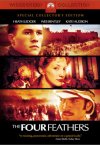BUY THE DVD:
|


|
|
|
SYNOPSIS:
| |
a british officer resigns his post just before battle and subsequently receives four white feathers from his friends and fiancee as symbols of what they believe to be his cowardice.
|
|
|
MOVIE FACT:
| |
filming for this film began in october of 2000.
|
|
|
RATING:
|



three out of four possible stars
|
|
|
|
The rather young average age of its cast notwithstanding, The Four Feathers is two hours of some incredible performances and an impressive use of cinematography. While it might be easily compared to other screen versions of A.E.W. Mason's novel of the same name, this film has many differences in it from its predecessors and to focus on the movie itself, rather than how it stands up to those films that came before it, is probably a better use of bandwidth here.
What holds this film together, but strangely also tears it apart, is a combination of its performances and story. While the performances are certainly engrossing, and the story is engaging, there is still an amount of distance between this film's story and its audience. There is a lack of a specific point of view in this film, and in certain scenes, knowing what a character was thinking would have been beneficial. While most of the time it was sufficient to see a range of emotions cross a character's face, some further insight might have been a good addition.
Regarding the performances in this film, there are no weak performances, though some actors stand out more than others. In a role which quite separates him from his heart-throb status, Heath Ledger makes his character as believable as is humanly possible as the man who is called a coward after he resigns from his military regiment, only to set out for the Sudan to try and redeem his reputation. With a variety of hairstyles and tans, Ledger is a pleasant surprise on screen with the amount of drama he injects into his role. Although it may be easy to dismiss this picture on the basis that its cast is young for the material, age is no barrier for Ledger, as he gives a strong performance.
In their co-starring roles, Wes Bentley and Kate Hudson complete the main trio of actors with performances that are more than passable, though not as impressive as Ledger's. As they are both American, it is easy to see through their accents at times, but if one is willing to ignore that deficiency they, like Ledger, can convey much without a large amount of dialogue. In point of fact, Kate's performance is solid throughout the film but does become impressive during her most emotional scene near the end of the film. And Wes's character, being a reserved British military man, makes a good case for the argument that one does not need pages and pages of dialogue to make an impression. Bentley’s performance would most aptly be described as subtle, and that attribute fits his character well.
And although his face does not grace the movie poster, Djimon Hounsou makes his performance as an African caught in the middle of the war a memorable one. He probably has more screen time than Kate Hudson, and probably deserved a few inches of space on the movie poster. An aspect of the film which wasn't forgotten was the cinematography. Robert Richardson, the director of photography, has done an impressive job in conveying the vast desert conditions of the Sudan in 1898, but also shows how the desert can be claustrophobic as well. And an aspect which may be more the influence of the director (as he used the same tactic in Elizabeth), is the non-linear editing of some scenes.
While the film is told mostly in chronological order, certain individual scenes have shots that run out of sequence, and this is a good device to keep the audience's eyes busy. The filmmakers have also created a soundtrack that never lets go of the audience's ears either. James Horner is known for recycling his movie scores, but his work on The Four Feathers is quite different from the myriad other pictures he has composed music for. It is impossible to identify stretches of music that might have been borrowed from his other films, and with this score, Horner proves that he does have new ideas in his head. An added bonus to this unique score is that it compliments the film very well by never overtaking the characters, but still adding to the epic feel Shekhar Kapur probably wanted for his film.
Perhaps this story's distance could have been decreased if the editor, writer, or director had made a more concrete decision on how to end the film. It ends with some ambiguity that serves only to push viewers further away from becoming emotionally involved in the film. The bottom line is that the acting in this film will keep most, if not all, audiences glued to the screen for a fast-paced two hours. While it seems that some elements could have been explored in greater depth, the film doesn't have a second of downtime and this helps the distance one has to cover to reach the emotional core of the movie less difficult.
Review by Kelsey Wyatt.
| |
|